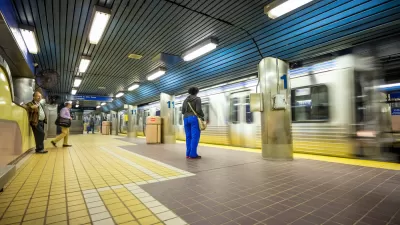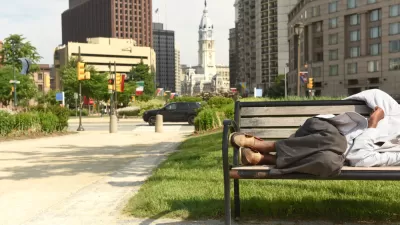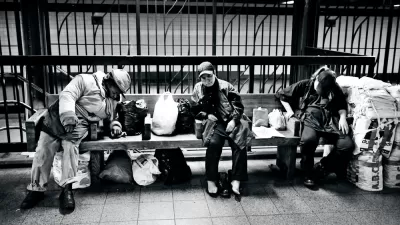Is "compassion fatigue" driving Philadelphia and other cities to adopt ordinances to crack down on the homeless? Homeless advocates contend that these measures are counterproductive, as they force the homeless into criminal means of getting by.
According to Yamiche Alcindor, more and more cities in the United States, such as Philadelphia, are enacting bans on camping, noise, and food sharing in an effort to combat homelessness. These new ordinances, which have been adopted by some of the largest cities in the country, are pitting public officials and their desire to "improve the lives of homeless people and ensure public safety" against homeless advocates, who "argue that such regulations criminalize homelessness and make it harder to live on the nation's streets."
Philadelphia's recent ban on outdoor feeding of people in city parks is intended to draw the homeless inside where, "they can be connected with other social service programs and possibly speak with officials such as substance abuse counselors and mental health professionals," while also "ensuring good public hygiene and safety."
However, according to Alcindor, "Critics argue that bans on feeding and camping often leave people with no where to eat or sleep because many cities lack emergency food services and shelters. Meanwhile, citing people who violate such ordinances costs cities money when officials try to follow up on such cases and hurts people's ability to get jobs and housing, because many develop criminal records."
Thanks to Akemi Leung
FULL STORY: Cities' homeless crackdown: Could it be compassion fatigue?

Alabama: Trump Terminates Settlements for Black Communities Harmed By Raw Sewage
Trump deemed the landmark civil rights agreement “illegal DEI and environmental justice policy.”

Study: Maui’s Plan to Convert Vacation Rentals to Long-Term Housing Could Cause Nearly $1 Billion Economic Loss
The plan would reduce visitor accommodation by 25% resulting in 1,900 jobs lost.

Why Should We Subsidize Public Transportation?
Many public transit agencies face financial stress due to rising costs, declining fare revenue, and declining subsidies. Transit advocates must provide a strong business case for increasing public transit funding.

Wind Energy on the Rise Despite Federal Policy Reversal
The Trump administration is revoking federal support for renewable energy, but demand for new projects continues unabated.

Passengers Flock to Caltrain After Electrification
The new electric trains are running faster and more reliably, leading to strong ridership growth on the Bay Area rail system.

Texas Churches Rally Behind ‘Yes in God’s Back Yard’ Legislation
Religious leaders want the state to reduce zoning regulations to streamline leasing church-owned land to housing developers.
Urban Design for Planners 1: Software Tools
This six-course series explores essential urban design concepts using open source software and equips planners with the tools they need to participate fully in the urban design process.
Planning for Universal Design
Learn the tools for implementing Universal Design in planning regulations.
Caltrans
Smith Gee Studio
Institute for Housing and Urban Development Studies (IHS)
City of Grandview
Harvard GSD Executive Education
Toledo-Lucas County Plan Commissions
Salt Lake City
NYU Wagner Graduate School of Public Service





























